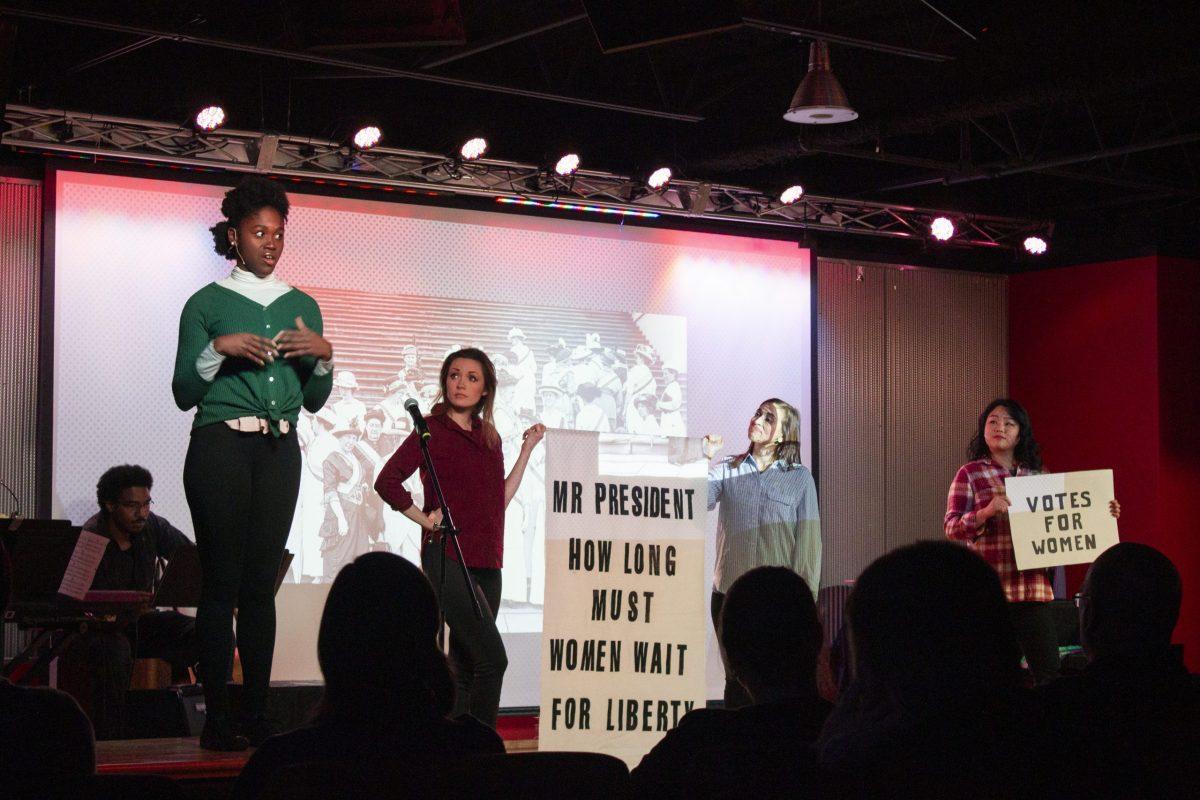The f-word is feminism, at least it is in Radiant Bloom Productions’, “The F-word,” a show that celebrates the diversity of women and the many conflicting beliefs about feminism.
The Women’s Leadership Initiative (WLI) held a showing of “The F-Word” on Nov. 14 in The Perch. Kelsey Welsh ’22, co-director of campus relations for WLI, said this event was important for the club to host because a lot of people at St. Joe’s come from backgrounds where they never had to talk about feminism prior to college.
“Classes [at St. Joe’s] don’t talk about how feminism has developed over time and what it actually means,” Welsh said. “Coming to a campus like St. Joe’s that is so homogenous, where everyone comes from the same type of background, introducing these types of ideas is very important to just open up people’s minds.”
The five female cast members of “The F-Word,” start the show by defining feminism as, “The advocacy of women’s rights on the basis of the equality of different sexes.”
They then transition to acting out the history of American feminism through storytelling, chronologically moving from the first wave of feminism, which focused on gaining the right to vote throughout the nineteenth and twentieth centuries, to the current fourth wave of feminism, which focuses on sexual harrassment, body shaming and rape culture.
The cast frequently broke out into empowering songs such as “Respect” by Aretha Franklin and “Rise Up” by Andra Day.
“I think the amount of content they covered was amazing,” Welsh said. “The amount of engagement with the audience was also amazing to see.”
“The F-Word” allowed for an interactive exercise at the conclusion of the show, where the cast held a Q&A session. Audience members wrote down any lingering questions about feminism they had on sticky notes, and submitted them anonymously for the cast to answer.
“This particular type of event is important because it mixes up the usual lecture and brings this conversation in a different format, so that people who haven’t engaged in this conversation prior can feel more comfortable,” said Imani Briscoe, program specialist for inclusion and diversity experiential programming (IDEP). “Just coming into the space and learning something [is important].”
Maria Johnson ’21, attendee of “The F-Word” showing, said this event offered a safe space for education for the St. Joe’s community to enter in to.
“It gave people a forum to educate themselves without feeling that they are being judged,” Johnson said. “If they were ignorant about a specific topic, they could come and sit here and listen and they didn’t even have to ask any questions.”
WLI collaborated with the English department, the Center for Inclusion and Diversity (CID), the gender studies department, the Dean’s Leadership Program (DLP) and the Title IX coordinator to hold this event. Welsh said many programs were involved because each has a feminist lens they can look through to find importance in the event.
“The range of content that they covered, it really pulls together so many different areas,” Welsh said. “DLP [was involved] because so many different women leaders throughout history were mentioned [in the show], and it showed that there is no one right way to be a leader. And CID [was involved] because over time feminism has filled in women of color and people of different intersectionalities into that fold.”
With feminism comes controversy. Johnson said she believes this movement is such a controversial topic because the earlier movement had a lot to do with white feminism, which focused on the struggles of white women without addressing distinct forms of oppression faced by ethnic minority women and women lacking other privileges.
“It comes from the idea that there were for a long time very separate identities that people identified as that were united by feminism but that weren’t really connecting together,” Johnson said. “Particularly, when feminism started in the 1800s, it was very segmented and this has kind of carried due to the other things like racism and discrimination of people with disabilities and discrimination of people who are not neurotypical.”
Welsh said “The F-Word” really drove home the message that, with the fourth wave focusing on inclusivity and intersectionality, there are now different definitions and types of feminism that have strayed away from its once discriminatory and exclusive foundation.
“This is really important, especially in this day and age, when identity is such a fluid, nonconforming thing,” Welsh said. “I think that’s the basis for a lot of conflict, but it also gives a very beautiful opportunity for it to grow and be more encapsulating of different people.”
Johnson said given the recent racial bias incidents that have occurred on campus this semester, events like these should be more frequent.
“I really hope [WLI] has more events like this, not necessarily having to do with feminism, but events like this where people can come and educate themselves are really important,” Johnson said.






































